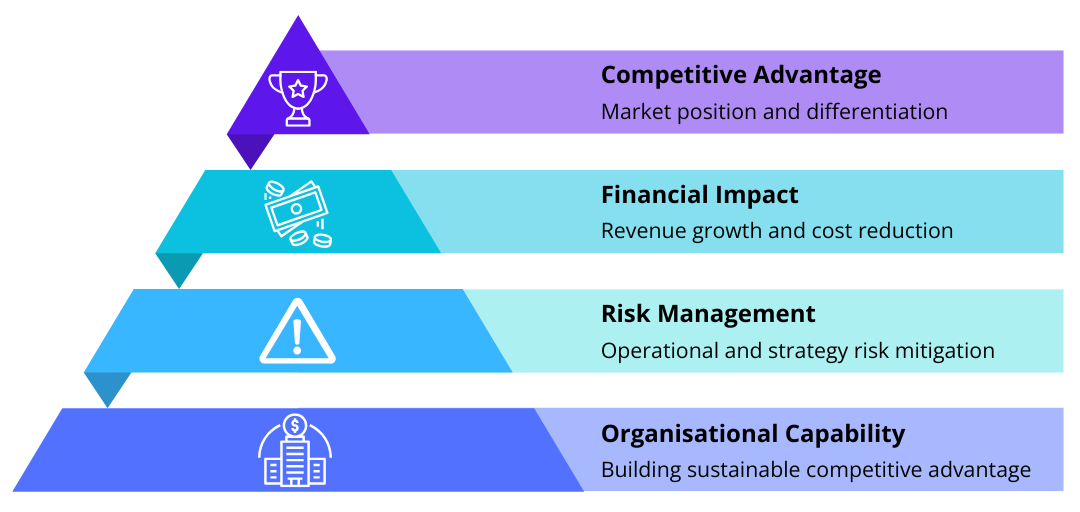The AI Translator: The £200K Role No One Saw Coming
The AI Person Everyone Needs Who Doesn't Code
Two weeks ago, my business partner Tim had coffee with a former colleague. The conversation wasn't about new opportunities or exciting projects. It was about funding cuts.
This individual—along with several of his colleagues—is watching their AI initiative budgets disappear. The reason isn't what you'd expect. It's not because leadership has lost faith in AI. It's because they've lost faith in the people implementing it.
"These projects aren't delivering any ROI. We're 14 months in, costs have doubled, and we still can't get the damn things to work properly."
This isn't an isolated story.
Across enterprises globally, projects are failing spectacularly—not because the technology doesn't work, but because there's no proper design, no architecture consideration, and certainly no business strategy beyond "we need AI." These initiatives are overrunning on time and cost whilst producing nothing of value.
What Tim’s colleague was essentially telling him was something I've been seeing in client meetings for months: the emperor has no clothes.
But here's the thing that's really interesting about this situation. The failure of these consultant-led AI projects isn't creating less demand for AI expertise—it's creating demand for a completely different type of professional.
The second order effect of this situation is opening up a market for someone who can bridge the gap that's been causing all these expensive failures in the first place.
The Translation Crisis
You see, there's a fundamental communication breakdown happening in every organisation attempting AI transformation.
Engineers speak tech.
Executives speak business.
And never the twain shall meet.
This is precisely why you have consultants in expensive suits with promises and PowerPoint decks in the first place. They're supposed to be the translation layer. But here's the unpopular truth: they're not there to translate for the business—they're there to make money.
The translation need is absolutely real. It would save organisations millions in wasted investment if there were professionals with genuine technical understanding who could convey the benefits and risks of generative AI and agentic systems to leadership in meaningful, business-centric terms.
More importantly, these professionals could prevent projects from starting when they're nothing more than expensive pet projects that should never see the light of day.
Why I'm Qualified to Spot This Trend
I'm in a unique position to see this gap because I live in both worlds. At nearly 50, I'm an engineer with an MBA who runs his own AI consultancy. I sit in meetings where I have to fill this translation role constantly. In fact, I regularly qualify myself out of opportunities because potential clients simply don't know what they're doing.
They come to me saying "I need AI in my business strategy"—which, of course, isn't a strategy at all. Because I understand both the technical realities and the business implications, I can see when they're heading for disaster. I have the luxury of being able to refuse work with clients who are pursuing the wrong approach, but most professionals don't have that advantage.
Most people can't wear both hats. They're either technically competent but struggle with business communication, or they're business-savvy but lack the technical depth to understand what's actually possible with AI. This creates a massive opportunity for professionals who can develop both skill sets.
The Market Evidence
Even with a relatively rudimentary search, I've found over 800 jobs currently listed globally that are essentially looking for people who can translate in an AI project context. These aren't traditional engineering roles or standard business analyst positions—they're hybrid roles that require someone who can understand AI technology deeply enough to assess feasibility whilst communicating business value clearly enough to secure executive support.
The salary ranges are compelling: £80,000 to £200,000+ depending on seniority and location. But more importantly, these roles are being created by organisations that have learned from the failures of the consultant-led approach. They want someone internal, someone who understands their business, someone who can prevent the next expensive AI disaster.
The Invisible Role That's About to Explode
This is the role I'm talking about: the AI Business Translator. It's invisible because it doesn't have a standardised job title yet. Companies are calling these positions everything from "AI Project Manager" to "AI Solutions Consultant" to "AI Transformation Lead." But they all require the same core capability: the ability to translate between technical possibility and business reality.
The professionals who master this translation capability won't just have job security—they'll probably become indispensable. They'll be the ones executives turn to when they need to understand AI opportunities. They'll be the ones who control which projects get funded and which get killed. They'll be the ones who shape how their organisations approach AI transformation.
And right now, almost nobody is doing this role well.
The Three Skills That Define the AI Translator
After analysing successful AI POCs and implementations, three distinct capabilities emerge as essential for this emerging role.
Translation Mastery
The ability to convert technical AI concepts into business language that drives decision-making, and business requirements into technical specifications that enable successful implementation.
Stakeholder Orchestration
The skill to identify, engage, and align diverse stakeholder groups around AI initiatives, managing the complex human dynamics that determine project success or failure.
Opportunity Framing
The strategic capability to identify genuine AI opportunities, evaluate their business potential, and present them in ways that secure resources and support from leadership.
These aren't traditional technical skills or standard business competencies. Let’s have a look at these in a bit more detail.
1: Become the AI Translator Everyone Trusts
When you master this translation ability, you become the person executives call first for AI guidance. You're no longer struggling to explain AI value—you're the one who makes complex AI simple and compelling.
The challenge isn't avoiding jargon. It's understanding what different stakeholders actually care about and speaking their specific language.
CFOs care about three things - capital investment implications, operational expense impact, and financial risk mitigation. Don't talk about the latest LLM—talk about "systems that reduce manual processing costs by 40% whilst maintaining audit compliance."
CEOs think strategically - market positioning, competitive advantage, and transformation opportunities. They want to understand how AI fits into broader business strategy, not how algorithms work.
Legal teams focus on risk - regulatory compliance, liability management, and ethical standards. They need governance frameworks, not technical specifications.
Those who master this translation skill become indispensable because they bridge worlds that often struggle to understand each other. After all, with the obvious except of actual tech businesses, most companies don’t have an IT layer in their exec pyramid of priorities. That’s because the technology supports what most businesses do, it’s not the driver.
2: Master the Art of AI Stakeholder Influence
This skill transforms you from someone who attends AI meetings to someone who leads them. You become the professional who gets stakeholder buy-in while others struggle with resistance.
AI projects fail more often due to stakeholder resistance than technical limitations. Companies moving from experiments to enterprise rollouts need people who can navigate the complex human dynamics that determine success or failure.
Technical teams worry about system integration, security implications, and operational complexity. They need architecture decisions, performance requirements, and maintenance implications.
Operational teams focus on process impact, training requirements, and workflow integration. They're concerned about change management, quality assurance, and resource allocation.
Legal and compliance teams need governance frameworks, risk assessments, and regulatory compliance strategies.
The key insight: Stakeholder orchestration requires different communication approaches for different groups. You can't use the same presentation for the CFO and the IT director—they care about fundamentally different aspects of AI implementation.
3: Transform into the AI Opportunity Spotter
Master this skill and you become irreplaceable.
You're the strategic mind who spots AI opportunities others miss and frames them in ways that get approval. You can do this because you have design fluency and domain expertise.
This is the apex skill of the three and is very rare. If you can identify, evaluate, and present AI opportunities in business terms, you're going to make a lot of money.
AI budgets are tightening as organisations move beyond experimentation. Leadership doesn't want technology demonstrations—they want clear business cases that show measurable value.
The strategic assessment requires evaluating AI opportunities across multiple dimensions:
Spotting competitive advantage - Does this give the company an edge?
Business impact potential - Does this move any needles?
Technical feasibility - Can we do it?
Organisational readiness - Should we do it?
The business case development means connecting AI capabilities to specific business outcomes with quantifiable benefits. Understanding cost structures, revenue models, and operational metrics well enough to build credible financial projections.
Top tip: The best, most profitable opportunities align to removing dead-weight tasks from a process that AI can do, so humans can work on higher touch-point activities with customers. Relationships matter in business.
Why These Skills Matter More Than Technical Knowledge
The professionals who advance their careers in the AI era aren't necessarily the ones who understand the technology best—they're the ones who can communicate about AI most effectively. They become the bridge between AI possibility and business reality.
These communication skills are particularly valuable because they're rare.
Most AI education focuses on technical implementation rather than business communication. This creates a significant opportunity for those who invest in developing these capabilities, especially if you already have a technical background.
Your next steps are clear: while AI continues to evolve rapidly, the fundamental need for translation between technical teams and business stakeholders will only intensify. Companies are moving from AI experiments to enterprise-scale implementations, and they desperately need people who can guide these conversations with confidence and credibility.
The question isn't whether you can develop these skills—it's how quickly you'll choose to start.
Until next time,
Chris
🧰 Whenever you're ready, I might be able to help you.
Ready to up-skill and transform your career in the AI economy?
Join our paid subscribers to unlock the complete AI Agent Business Translator Toolkit - 18+ frameworks, tools, and templates. 7-day free trial included.
Research Sources & Data
The data referenced in this article is based on research conducted in June 2025 across major job platforms and market analysis sources.
Key Statistics Verified
840+ AI Communication Roles Currently Available
Source: Indeed.com, ZipRecruiter, LinkedIn Jobs, Glassdoor
Research Date: June 16, 2025
Geographic Scope: US, UK, EU, Remote positions
Salary Ranges: £80,000-£200,000+ (80k−80k-80k−255k USD)
AI Project Managers: 80,000−80,000-80,000−205,000 (ZipRecruiter, Built In)
AI Consultants: 120,000 median, up to 120,000 median, up to 120,000 median, up to 255,000 senior roles (Management Consulted, Capco)
AI Solutions Consultants: 110,000−110,000-110,000−216,000 (Glassdoor, SVAngel)
Communication Skills Consistently Required
"Strong communication and stakeholder management skills" (Robert Half, Amaze Systems)
"Bridge the gap between business strategy and AI-driven solutions" (919USA)
"Explain complex technical concepts to business stakeholders" (Management Consulted)
Primary Job Platform Sources
Indeed.com: Remote AI Analyst Jobs
ZipRecruiter: AI Project Management Jobs
LinkedIn Jobs: AI Project Manager roles
Glassdoor: AI Solutions Consultant
Built In: AI Transformation Lead
Market Analysis Sources
Management Consulted: AI Consulting Career Guide
Coursera: AI Jobs Market Analysis
Major Firms Actively Hiring
Accenture, Deloitte, IBM, KPMG, McKinsey (QuantumBlack), Microsoft, PwC, BCG, NTT DATA, Capco, Trace3





My husband is a data scientist who understands, process, design, implementation and rapid improvements/streamlining and he is having trouble getting a position. It isn’t that they don’t have qualified folks, but hiring personnel do not know the skill sets that are needed.
Damn. I think I'm that exact guy. And unemployed 🤔